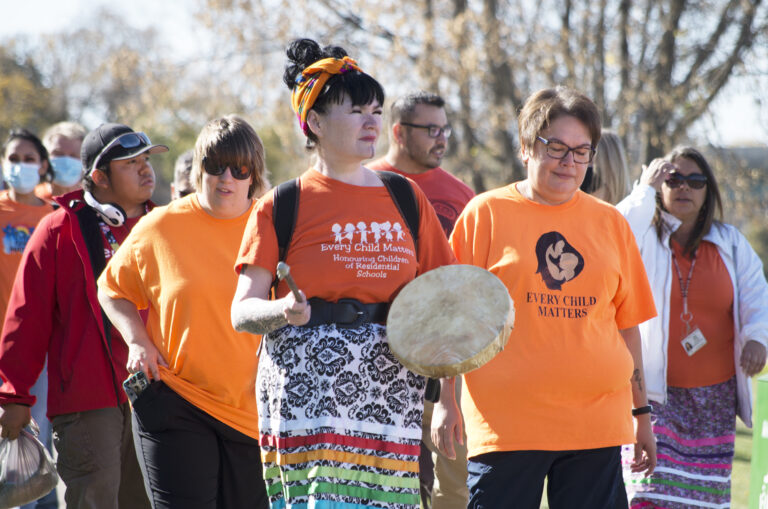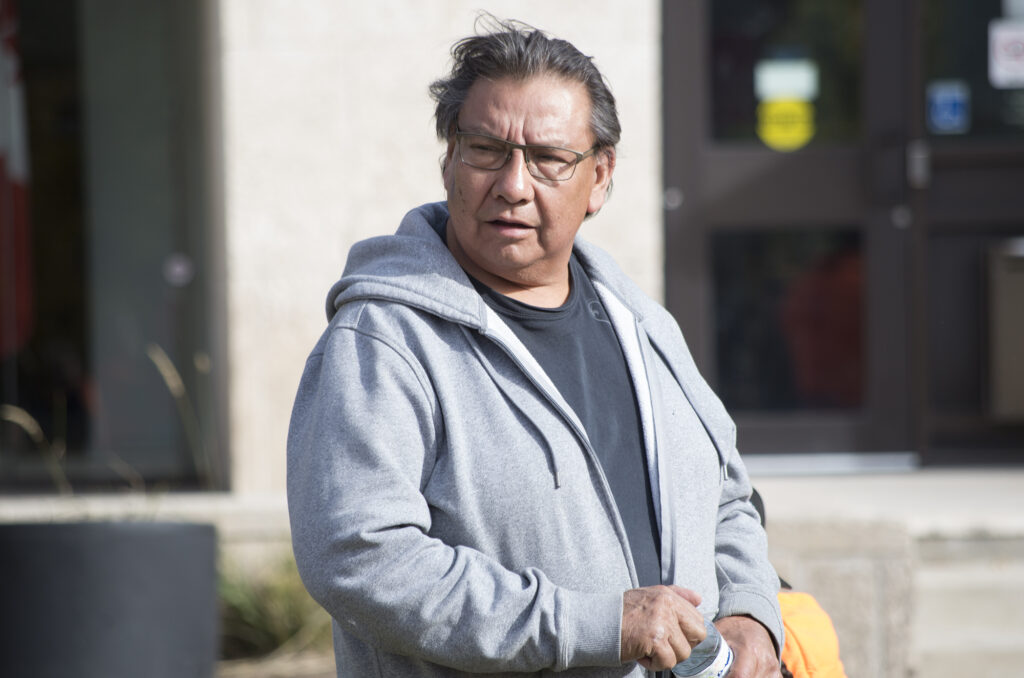
Neena Guy’s father never talked about his experience at residential school, but she still felt the effects.
Growing up, Guy learned next to nothing about her culture, her ancestors, and their way of life. She said the family was ashamed of her culture. It’s only now that she’s starting to take pride in it, and she credits events like National Day for Truth and Reconciliation for helping spark it.
“It brings pride to my heart,” Guy said, when asked seeing all the support for the 5 km Truth and Reconciliation Day Walk she organized with her husband, Corey. “When I was growing up, I didn’t know anything about my culture and what it meant to be Indigenous, and everything that surrounded that. I grew up with shame, and I’m finding my voice now.”
Attendees marched from Memorial Square just outside City Hall to the MMIWG monument, then walked along the riverbank before circling back to City Hall. Once there, attendees stopped for a drumming group at precisely 2:15 p.m., in recognition of the 215 unmarked graves uncovered near the former Kamloops Indian Residential School.
Guy said recent discoveries in Kamloops, Cowessess, and elsewhere have pushed Canada’s relationship with Indigenous peoples into the headlines, and made residents dig into the country’s history, sometimes for the first time. She hopes events like National Day for Truth and Reconciliation will help keep that trend going.
“People are starting to understand it’s real,” Guy said. “These things did happen. It’s not something that was just made up. Wearing the Orange Shirts, I can’t describe it … there’s just pride in it. (It’s) for people to openly express their support for Indigenous culture.”
While many participants and organizers focused on Canada’s history, others are more concerned about Canada’s future.
Harold Burns, an elder from James Smith Cree Nation, started attending a residential school at age seven. He said many Canadians have already heard about the abuse and mismanagement that plagued the schools. Now he’s wondering what everyone is going to do about it.
“We have to move on from there, and how do we move on?” Burns said. “Throwing money at people is not going to solve things.”

On Thursday, Burns takes time out of his take to talk about his experience with the 5 km walk attendees shortly after the drumming ceremony. He said it’s important to recognize what happened at residential schools, but said the problems go far beyond the education system. He’s particularly concerned about homelessness, poverty, and wants federal and provincial leaders to take a hard look at how they manage and fund programs to address those issues.
“I’m fortunate because both of my grandchildren are in university, but what about my other relatives who are not in university or not going to trade school?” Burns said. “What happens to them? We’ve got a system that we have to fix.”
Burns said funding comes from the top, but change needs to start at the local level. For him, that means reconnecting with his culture, something he’s eager to do with his children and grandchildren alongside him.
“I think about what my children and my grandchildren. How do we break that cycle? To me, breaking that cycle is going to sun dances(and) going to sweats,” he said.
The 5 km walk was just one of many ways Prince Albert residents observed the first National Day for Truth and Reconciliation.
The Prince Albert Urban Indigenous Coalition (PAUIC) hosted a one hour virtual event in partnership with Communities Building Youth Future Prince Albert (CBYF-PA). The event featured a commemorative educational video that premiered on the group’s YouTube channel Thursday morning.
PAUIC co-host Janet Carriere delivered the opening remarks, and said the goal was to give people a chance to learn as much as possible.
“As you watch the videos today, you will learn and get to understand the significance of the Orange Shirt—how it came about and what it means,” she told viewers. “I would like you to take this opportunity to learn as much as you can so in the spirit of reconciliation we can all move forward in a good way.”
Camryn Corrigal and CBYF-PA assistant coordinator Nicole Mathies also delivered opening remarks. They said the event was important to honour those impacted by residential schools, and re-affirm the importance of implementing the Truth and Reconciliation Commissioners Calls to Action.
The Gabriel Dumont Institute recognized Canada’s first National Truth and Reconciliation Day by commissioning a group of local artists to write a song for the occasion. Metis musicians John Arcand and Freddie Pelletier accompanied Shelia Pelletier as she sang “We’re bringing the children home,’ a song written by Arcand for the occasion.
GDI said the song is a tribute to the people and communities who suffered due to residential schools, and a way to honour the grieving families and survivors.
“The recent truth that thousands of children died at residential schools, and are still there in unmarked graves, must touch the heart of every person who learns about it,” GDI wrote on their Facebook page. “At present, it seems most appropriate to listen, learn, and think about this.”
Churches also held their own events on Thursday. In the Roman Catholic Diocese of Prince Albert, pastoral centre staff spend the day learning about Truth and Reconciliation and residential schools, and Bishop Stephen Hero held a 15 minute virtual service where he asked God to help Canadians honour the message of Truth and Reconciliation, and bring peace.
St. Alban’s Anglican Cathedral hosted a service of hymns and readings to mark the National Day for Truth and Reconciliation, while Calvary United Church posted a short talk from moderator Richard Bott explaining the symbolism of the orange shirt, and it helped Canadians remember the negative impact residential schools had on Indigenous people.
Messiah Lutheran Church in Prince Albert closed its office doors for the day, and urged members to use Sept. 30 to “listen, learn, and reflect” in a post on their Facebook page.
